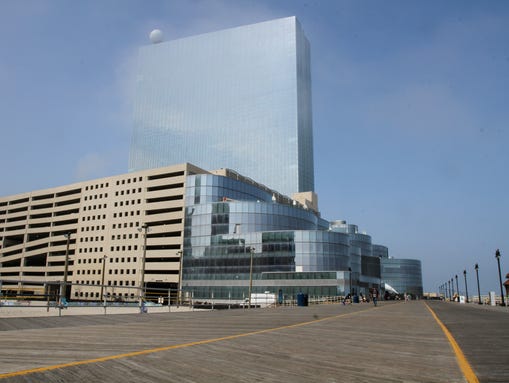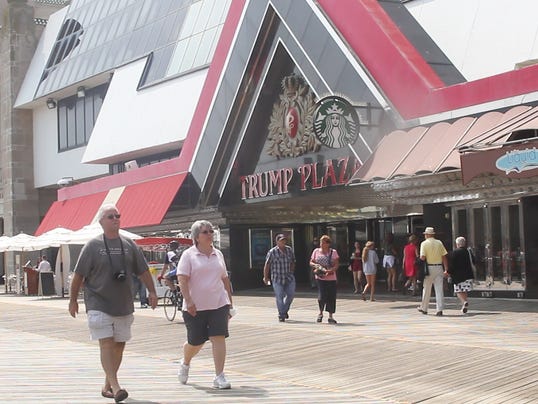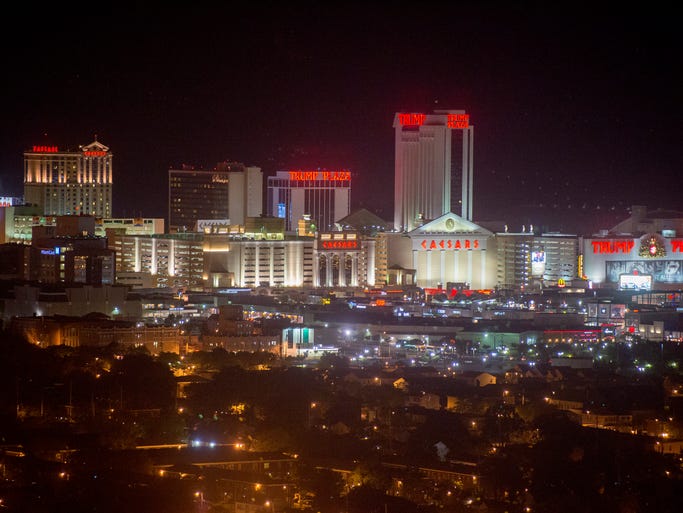ASBURY PARK, N.J. — With Atlantic City's gambling monopoly in tatters and the city making a slow transition to becoming a more family-friendly resort, officials on the Jersey shore are bracing for a dry spell.
They have seen the good times: employees with middle-class wages who can buy homes, visitors who spend money on the drive down, and precious tax revenue.
And the bad times?
"When Atlantic City suffers, the entire area suffers," said David Breeden, administrator of the town of Barnegat.
About 100,000 jobs, or 2 percent of the state's workforce, were tied to the gaming industry in some way, according to a 2008 Rutgers University study.
"It breaks my heart to see this happening to our people," said Little Egg Harbor Mayor Arthur Midgley, who estimated there are 1,000 to 1,500 people in his town of 16,000 who work in the casino industry. He said the impact of casino industry contraction on Little Egg Harbor's economy could be devastating.
Atlantic City's $2.9 billion casino industry is retrenching, and few areas in the state will escape the pain that comes with it. The biggest concerns: a flood of unemployed workers and falling incomes and property values that will cut into tax revenue.
The casino industry and its workers paid nearly $1 billion in state and local taxes in 2008, the Rutgers study said.
The casinos' losing streak, ongoing since 2006, has picked up momentum this summer. The 2-year old, 1,900-room Revel entered bankruptcy for a second time, and the older Showboat and Trump Plaza casinos announced they plan to close at the end of the season. It has prompted local leaders and visitors to press the city to give up chasing gambling dollars and focus on other entertainment options.
For a city whose roots include speakeasies and gangsters, it represents a culture change that hasn't yet kicked in. And even if the city makes a perfect transition, attracting families and conventioneers, it will take many years to make up for the more than $2 billion in revenue that's been lost at the casinos.
"It's coming at a bad time," Stafford Mayor John Spodofora said, noting many residents of his town are still trying to rebuild after Superstorm Sandy struck in October 2012. "There are not many big corporations that hire people down here. The casinos have been a bit of a boon for people down here."
For now, Atlantic City has 11 casinos that have generated $1.3 billion in revenue during the first six months of the year. That's down 7 percent from the same time last year, according to state statistics.
On a recent summer day the boardwalk was teeming with visitors. But many have been here before, and by their observations, times have changed.
'It breaks my heart to see this happening to our people.'
Arthur Midgley, mayor of Little Egg HarborDanny and Joyce Chiara of Jersey City were walking on the boardwalk Tuesday, taking a break from gambling at Caesars. Their three-night stay was free, but they said they lost enough at the slot machines for the casino to make up for it.
The Chiaras have been coming here for 20 years. For the past few, they have passed Pennsylvania casinos that are closer to home to visit the seaside resort. But they think the casinos have been scaling back on their comps — the freebies to encourage visitors to gamble there.
"They gave you so much more years ago," Joyce Chiara said.
Fast fall
The collapse has been swift. Atlantic City, which started the year with 12 casinos, might end it with eight.
Among the casualties:
The Atlantic Club closed in January.
Revel, the glitzy $2.4 billion casino that opened in April 2012 on the north end of the boardwalk, filed for bankruptcy in June. The casino is scheduled to be auctioned in August.
Also in June, Caesars Entertainment Corp. said it would close Showboat at the end of August.
Last week, Trump Plaza Associates said it expected to close Trump Plaza Hotel and Casino around Sept. 16.

An empty boardwalk in front of the Revel Casino in Atlantic City, N.J.(Photo: Mike DeSocio, Asbury Park (N.J.) Press)
All told, the four casinos account for more than 8,000 jobs, or 25 percent of the industry's employment, said Bob McDevitt, president of Local 54 of UNITE-Here, the city's casino workers' union.
This summer's abrupt downsizing has come as little surprise. Atlantic City's 30-year near monopoly on East Coast gambling has been shattered during the past eight years as Pennsylvania, New York and Delaware opened casinos in the heart of Atlantic City's customer base.
The market — motorists who are within a full-tank of gas from Atlantic City — is worth about $6 billion, said Israel Posner, executive director of the Lloyd D. Levenson Institute of Gaming, Hospitality and Tourism at the Richard Stockton College of New Jersey.
It's still a lot of money, but Atlantic City casinos are learning a hard lesson about the perils of competition. No longer is it enough to open the doors and wait for the crowds to arrive. Now, they need to shift gears: find a niche, refurbish, innovate, add restaurants, spas and other non-gambling options, Posner said.
"The market for casinos themselves is fairly saturated," Posner said. "The real important question is, what is the quality of the product that is offered in that casino-hotel?"
Painful transition
It's unclear if a revamped Atlantic City will ever offer the same types of well-paying jobs that the casinos brought to the area. Absecon resident Melanie Gillespie has worked as a cocktail server at the Showboat for 18 years.
"It's a great job, full-time work, pension, benefits," said Gillespie, 37, a single parent with an 11-year-old daughter. "I've been able to raise my daughter on this job for her whole life."
Union President McDevitt said that while Atlantic City is in the midst of "a horrible crisis," all is not doom and gloom. The city still draws about 27 million visitors a year and is still drawing new investment, he said
Atlantic City Mayor Don Guardian, who took office in January, said casinos will play a much reduced role.
"We had gaming, and we put all our eggs in one basket," Guardian said during a recent teleconference. "We were foolish. We had a monopoly."
They are trying to take a page from Las Vegas, where gambling generates only about 30 percent of revenues, with retail, entertainment and dining making up the rest, according to Liza Cartmell, president of Atlantic City Alliance, a casino-funded marketing group. Gambling still accounts for more than 70 percent of Atlantic City's revenue.
Cartmell noted that it took Las Vegas 20 years to make the transition.
To do that, Atlantic City is focusing on its natural assets to lure visitors: its wide Atlantic Ocean beaches and famous boardwalk have been crowded on recent summer weekends, officials said.
Atlantic City has formed Meet AC, a nonprofit agency funded with $8 million from the Casino Reinvestment Development Authority, the CRDA. It will focus on attracting meeting and convention business, she said.
Atlantic City has seen non-gaming revenues — like income from bars, eateries, spas — rise by more than $160 million in the past two years to nearly $1 billion, Casino CRDA Executive Director John Palmieri said during the teleconference.
But gaming revenue has declined by more than $2 billion since 2010.
Boardwalk visitors last week said they noticed the changes. But they had plenty of ideas for improvement, most of which involved water activities like swimming pools and water slides for children.
George and Marla Korkus of Plymouth Meeting, Pa., visited with their three young children and offered reassuring comments for New Jerseyans: Sure, Pennsylvania's casinos are nice, but they don't have the beach and boardwalk.
But they also noticed a town still clinging to its gambling roots. The swimming pool at Caesars is open only for adults. It means if the Korkus family is trying to find a place to visit during the winter, Atlantic City won't be in the mix.
"Maybe if anything they would make it a little bit more family friendly, (offer) a little more for the kids to do," Marla Korkus said.
Read or Share this story: http://usat.ly/1msRdOJ
| < Prev | Next > |
|---|








 Copyright © 2025 ToCasino.net Online Casino. All Rights Reserved. Designed by
Copyright © 2025 ToCasino.net Online Casino. All Rights Reserved. Designed by